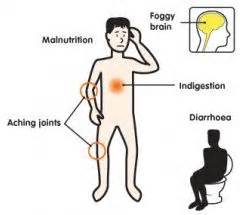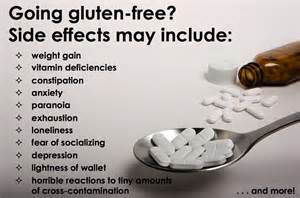Know Gluten Free Side Effects
Gluten is a protein found in barley, rye, oats and wheat. Some new research studies have come out and grains of all types do have gluten proteins (cross-reactors) in them and should be avoided by anyone who is sensitive to gluten or has celiac disease. This would include; corn, rice, buckwheat and sorghum to name a few.
While a gluten free diet is beneficial for intestinal health for people with celiac disease and those who are sensitive to gluten, some of these individuals may also experience some gluten free diet side effects and most of these effects can be observed.
Gluten is toxic to people with celiac disease and those who may be intolerant to gluten, which causes damage to the small intestine when gluten is consumed.
However, not all persons that are on a gluten free diet will show or display the same symptoms or reactions from these side effects. They will vary from person to person keep that in mind.
To learn more about gluten and it’s sensitivity and what are some of the side effects when going on a gluten free diet, view the video by Dr. Axe below.
Side Effects of A Gluten Free Diet Video
 Leaky Gut
Leaky Gut
If you have been diagnosed with gluten sensitivity or celiac disease, it is highly probable that you have a leaky gut. A leaky gut is where the intestines allow passage of stuff and your immune system attacks it as a foreign invader. What are the seven signs to determine if you have a leaky gut? This is a wonderful article by Dr. Axe that explains it very well.
Otherwise you may find your body attacking the gluten free foods that are good for you and will make you feel just as you ate gluten. Be sure to check with your doctor and determine if you have a leaky gut.
Biggest Side Effect – The Gluten Free Diet
Back to Top…
The biggest side effect is getting used to the gluten free diet once you are off eating gluten foods. It will take some time for your body to get adjusted to the new diet. However, over time, your body will adjust. It is recommended that before you begin to start eating gluten free grains that you wait thirty days to allow your body to adjust. Otherwise you may develop sensitivities to gluten free foods that are good for you to eat.
 Six Gluten Free Side Effects
Six Gluten Free Side Effects
Do you know which gluten free side effect has the most impact on people when they are on a gluten free diet? You will now. We will help you to recognize them so you can take the appropriate corrective action when you see them. Just what are the side effects of a gluten free diet? The six main ones are mentioned below. These side effects will not be observed with all patients. Each person is unique and will experience different side effects when they are going gluten free.
Side Effect #1 – Weight Gain
If you have celiac disease or are sensitive to gluten, your body doesn’t properly absorb fats and nutrients from the foods being consumed. It is quite common for individuals with celiac disease to be underweight and have difficulty in gaining weight. Once they begin the gluten free diet over time the intestines will begin to heal and will begin to absorb foods better. Often this results in the individual gaining weight.
Alternately, many processed gluten free foods are made with ingredients that are high in fat, carbohydrates and sugars. “premade gluten free baked goods, breads, pastas and snacks may be low in nutrition and high in calories”, states the University of Virginia Health System. Choosing too many processed gluten free foods may also cause weight gain while not providing beneficial nutrition. It is important to restrict these items for individuals that are on a gluten free diet.
Side Effect #2 – Nutritional Deficiency
Another huge side effect for individuals on a gluten free diet is a lack of nutrition in the foods they consume. Many gluten free foods are not enriched with vitamins and minerals which may lead to nutritional deficiencies. The University of Virginia Health System (UVHS) states “that many people with celiac disease may not consume enough calcium, vitamin D, folate or iron while on a gluten-free diet.”
A lack of these important nutrients may lead to additional medical problems such as osteoporosis, a thinning of the bones, or anemia, low blood iron. Learning how to combine gluten-free foods into nutritious combinations may help prevent, and reverse, nutritional deficiencies. Some of the deficiencies include calcium, vitamin b1, vitamin b12, and folate. As the meal planner of your home, it is essential that the meals you do prepare for the gluten free dieter contains the proper nutrition which includes vitamins, minerals and fiber.
Check out our related article on gluten free diet menus. There you’ll find the daily requirements for vitamins, minerals and fiber for all age groups.
Side Effect #3- Constipation
Another nutritional deficiency is a lack of dietary fiber in the gluten free diet which can lead to constipation and other bowel related issues. Fiber is important for moving waste through the intestinal system and promoting regular bowel movements. Gluten free foods are often made from enriched grains that are low in fiber, such as white rice.
Relying on too many processed gluten free foods, including crackers, bread, and pasta may reduce the amount of daily fiber being consumed on a daily basis. Meal planners need to include more whole grain brown rice, quinoa and vegetables into the diet; as these foods are higher in fiber, and may help stave off constipation and other related conditions.
Daily Fiber Requirements
Here are the daily requirements of fiber for all age groups including children. Be sure that the gluten free dieter consumes these amounts on a daily basis.
- Adult men under the age of 50 need 38 grams of fiber per day.
- Women under 50 need 25 grams of fiber per day.
- Men over the age of 50 need 30 grams per day.
- Women over the age of 50 need 21 grams of fiber per day.
- Children ages 1 – 3 need 19 grams of fiber per day.
- Children ages 4 – 8 need 25 grams of fiber per day.
- Boy’s ages 9 – 13 need 31 grams of fiber per day.
- Boy’s ages 14 – 18 need 38 grams of fiber per day.
- Girl’s ages 9 – 18 need 26 grams of fiber per day.
 Side Effect #4 – Increased Cholesterol Levels
Side Effect #4 – Increased Cholesterol Levels
A gluten free diet helps your intestines to heal so that food absorption becomes more efficient. This means that your body may also begin to absorb more fats from the food that are being consumed, which may increase cholesterol levels.
Choosing low-fat, low-cholesterol, gluten free foods may help keep cholesterol at normal levels. It is important that you have your cholesterol levels checked from time to time. Packaged gluten free products are often higher in fat than their gluten counterparts.
So, you will need to restrict their consumption. Be sure to read the nutrition labels carefully of all the foods you purchase to help control the consumption of cholesterol in foods being consumed.
Side Effect #5 – Not Sticking To Your Gluten Free Diet
If the gluten free dieter should accidentally eat a product that contains gluten, they may experience abdominal pain and diarrhea. Some individuals experience no signs or symptoms after eating gluten, but this doesn’t mean it’s not damaging the small intestines. Even trace amounts of gluten in the diet may be damaging, whether or not they cause signs or symptoms. It’s important that the gluten free dieter stick with their gluten free diet. This disease will not go away. It will remain with them all throughout their lifetime.
Side Effect #6 – Allergic to Dairy Products
In most cases, if you are sensitive to gluten, it is also possible that you may be sensitive to dairy products as well. It is highly recommended that when you or someone in your family is diagnosed with celiac disease or has gluten sensitivity, remove all dairy products from their diet. Any product that has milk as an ingredient should also be avoided when you are on a gluten free diet.
Self-Test For Gluten Sensitivity
If you are experiencing any of the gluten symptoms, you can perform a self-test to determine if you are sensitive to gluten. The easiest way is to not ingest any gluten for 30 days. If after thirty days you do not have any improved symptoms, it is possible that gluten may not be the problem. However, you can check this out by taking gluten for one week and see how you are feeling. If you feel better when not eating gluten, then you should stick with a gluten free diet. However, always confirm your gluten sensitivity with your doctor. Be sure to tell him/her your symptoms and also mention for them to test you for gluten sensitivity. They have tests that they can use to diagnose if this is your situation.
The Best Gluten Free Side Effect
The best site effect that will be visible is the gluten free dieter will begin to experience better health. They will be eating better, start to gain weight, have regular bowel movements and not get tired or exhausted as before. This is what the total gluten free diet is supposed to do.
Look Out For Those Cross-Reactors
When you are on the gluten free diet, you could eat or drink something that will trigger the same reaction you had when eating gluten. These foods and products are called cross reactors. The following is list of cross reactors that should be avoided when you are on a gluten free diet:
- Instant Coffee
- Dairy products all types
- Corn
- Oats
- Millet
- Rice
- Yeast (Brewer’s yeast and Baker’s yeast)
- Sugar & Fructose
- MSG
- Soy protein
- Aspartame (Sweetener usually found in diet sodas)
Note: Drinking fresh ground coffee is OK, but not instant coffee as it contains some proteins that has some cross reactors effecting gluten free dieters and needs to be avoided. Not all individuals may have a cross-reactor reaction to some of the foods mentioned above. However, it is highly recommended if you or anyone in your family has been diagnosed with celiac disease or has a sensitivity to gluten, these foods should be avoided.
Conclusion
As a parent or guardian knowing the side effects that an individual may encounter or experience will help you as you to deal with your child or adult who has celiac disease or gluten sensitivity as they age. If you have a young child with celiac disease, be sure to observe what is happening. If you should detect anything that is wrong, do not hesitate to contact your physician. Go back to gluten free diet with nutrition home page.
Shop Gluten-Free Side Effects Resources
Go back to the Gluten Free Diet With Nutrition home page.
